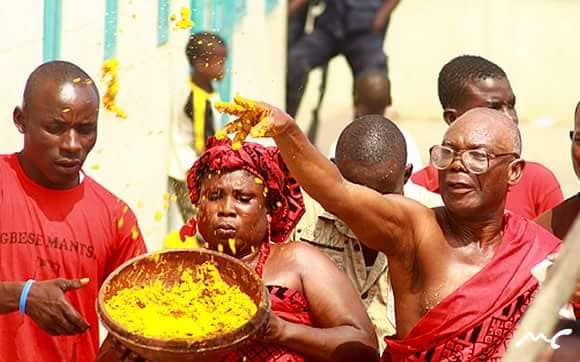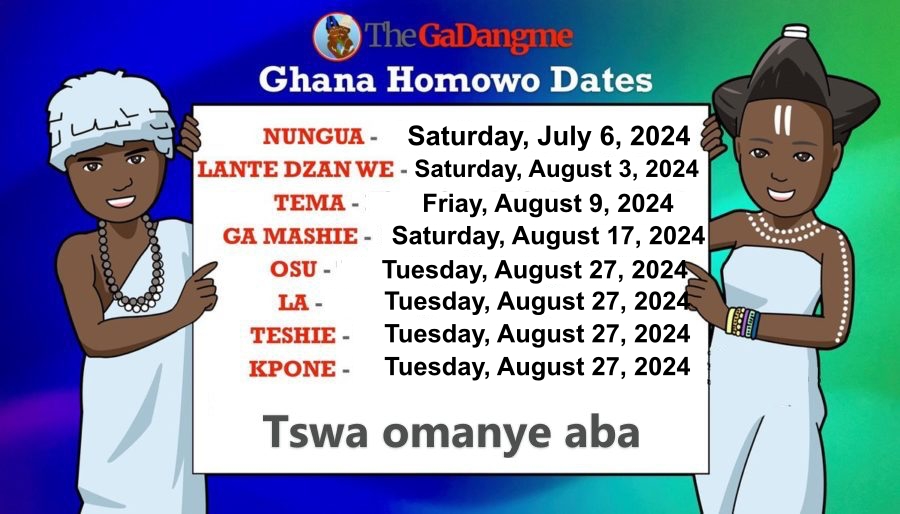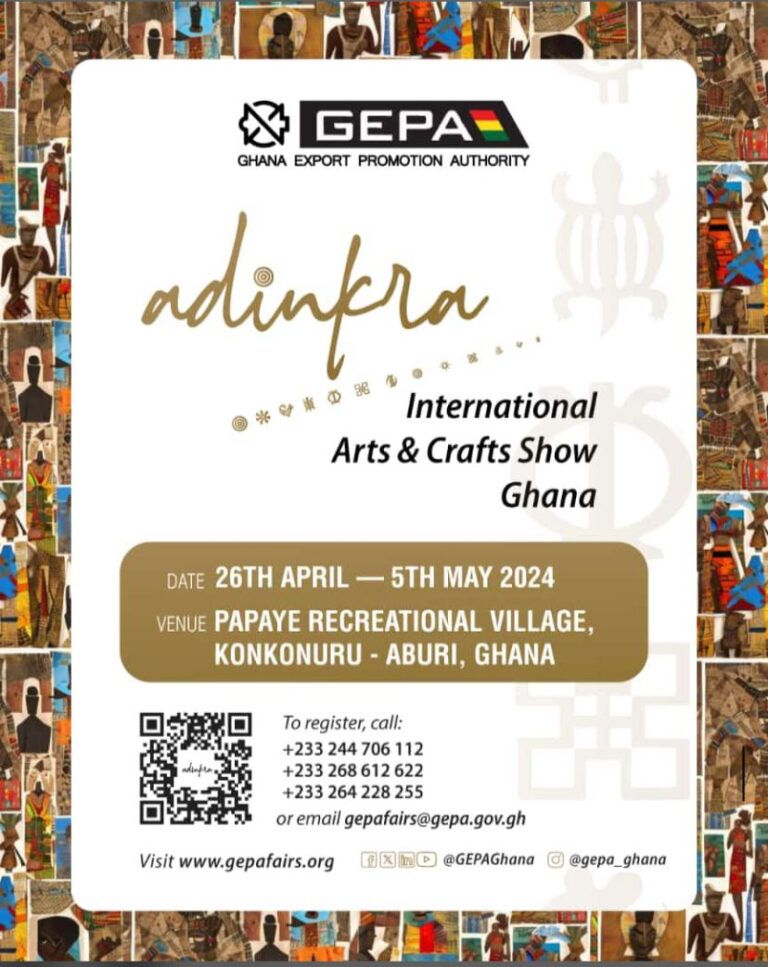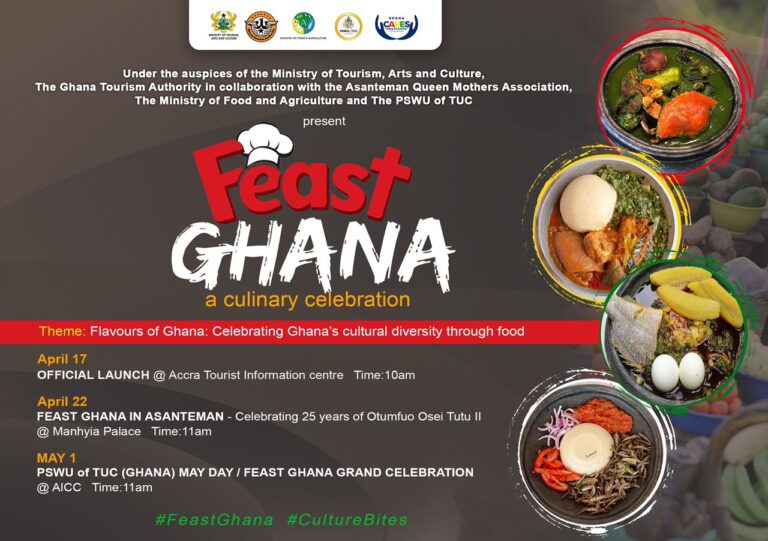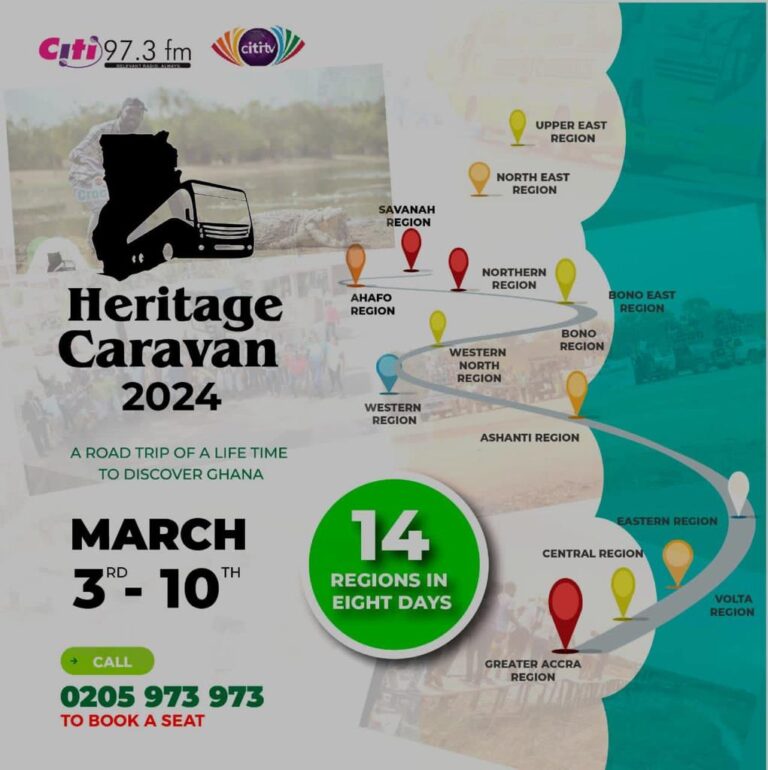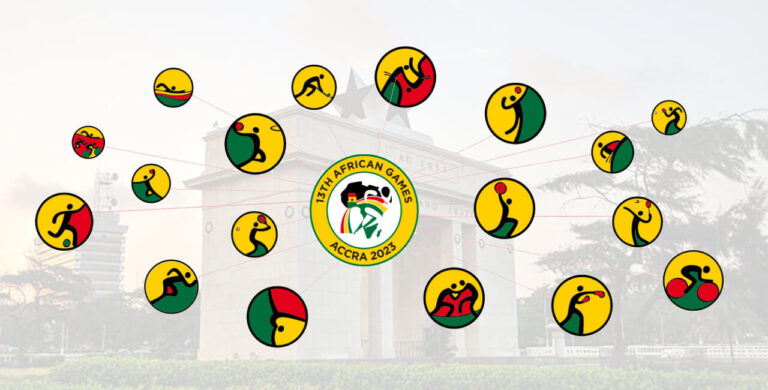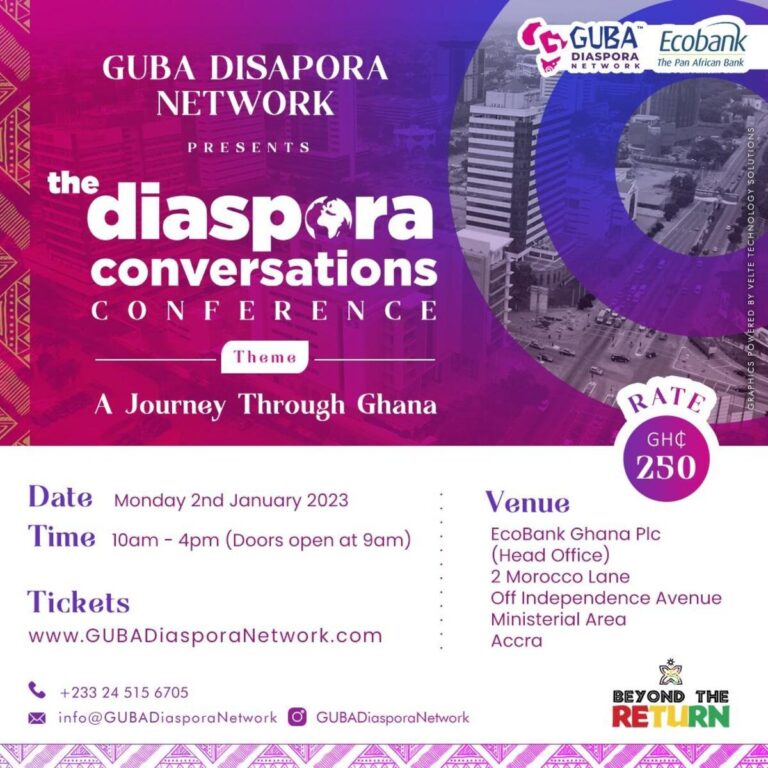About Homowo
The word Homowo (Homo – hunger, wo – hoot) can mean “to hoot (or jeer) at hunger” in the Ga language. The tradition of Homowo started with a period of hunger leading to famine due to failure of the seasonal rains needed by crops in the Greater Accra Region, where the Ga people predominantly dwell. When the rains returned to normal, the Ga people celebrated by creating the Homowo festival, hence its name and meaning.
Homowo is greatly celebrated in all the towns in the Ga state with celebrations climaxing in Gamashie. The celebration begins with the planting of maize, which will be used in preparing the food for the festival named Kpokpoi or Kpekple. During this period, noise making is prohibited or banned since it is believed that it disturbs the gods. The meal is eaten with Palmnut Soup and it is also sprinkled within the town. This is normally done by traditional leaders and family heads. Celebration includes marching down roads and streets beating drums, chanting, face painting, singing and traditional dances. Even though the celebration of Homowo is a Ga tradition, many other ethnic groups are welcomed to also join in the celebration. The homowo festival of the Ga tribe is believed to have a lineage from the Jewish tribe and its ancestral tradition of the Jewish Passover feast.
Some of the towns that celebrate Homowo are La, Teshie, Nungua, Osu, Ga-Mashie, Tema among others.
Homowo 2024 Dates
| NUNGUA | Saturday, July 6, 2024 |
| LANTE DZAN WE | Tuesday, August 27, 2024 |
| TEMA | Friday, August 9, 2024 |
| GA MASHIE | Saturday, August 17, 2024 |
| OSU | Tuesday, August 27, 2024 |
| LA | Tuesday, August 27, 2024 |
| TESHIE | Tuesday, August 27, 2024 |
| KPONE | Tuesday, August 27, 2024 |
Ban On Drumming and Noise-Making
Festival activities are usually preceded with a month-long ‘Ban on Drumming and Noise-making’ within the respect traditional areas. The period is dedicated for fasting and prayers for favourable rainfall, abundant harvest and to foster peace and tranquility amongst all.
During this period, residents within localities under the traditional authority of the respective traditional councils are expected to refrain from noise-making activities such as clapping of hands, use of musical instruments, funerals, parties and social gathering that involve noise-making.
These by-laws are enforced by teams with security personnel attached to them.
Date Range for the Ban is Monday 6th May 2024 – Thursday 6th June 2024. However, each traditional areas declares a month within this period.
OTHER ACTIVITIES
3rd Edition of Accra Inter-City Homowo Marathon
SCHEDULED FOR GA HƆMƆWƆ (HOMOWO) FESTIVITIES
××××××××××××××××××××××××××××××
SHI BAA – Cleaning and clearing of the sacred farm
All the Clans “We” perform “Shibaa” rite for the cleaning and clearing of the sacred farm for the planting millet. It is performed in the order as listed below.
×××××××××
1. Dantu We – Monday, 29th April 2024
2. Sakumɔ We – Tuesday, 30th April 2024
3. Korle We / Gbese – Friday, 3rd May 2024
4. Gua We – Saturday, 4th May 2024
5. Nai Ede We – Sunday, 5th May 2024
6. Nai We – Tuesday, 7th May 2024
ŊMAA DUMƆ – (Planting the sacred millet at their sacred farm)
– [Happens a week (7days) after cleaning/clearing]
××××××××××××
1. Dantu We – Monday, 6th May 2024
2. Sakumɔ We – Tuesday, 7th May 2024
3. Korle We / Gbese – Friday, 10th May 2024
4. Gua We – Saturday, 11th May 2024
5. Naide We – Sunday, 12th May 2024
6. Nai We – Tuesday, 14th May 2024
ŊMAA FAA – (Harvesting the sacred millet at the sacred farm)
– [Happens 3 weeks (21 days) after planting or a month after clearing]
××××××××××
1. Dantu We – Monday, 27th May 2024
2. Sakumɔ We – Tuesday, 28th May 2024
3. Korle We / Gbese – Friday, 31st May 2024
4. Gua We – Saturday, 1st June 2024
5. Naide We – Sunday, 3nd June 2024
6. Nai We – Tuesday, 4th June 2024
ODADAA/ODADAO – Ban on Drumming And Noise Making lifted
The final date for lifting of the ban on noisemaking is Thursday 6th June 2024
NSHOR ULEMO –
Tuesday, 23rd July 2024
YƐLƐ KƐ ŊMÃA YELI
×××××××××××××××××××××××××××××××
1. Blafo Yam feasting –
2. Dadeban Yam feasting –
3. Kotope Yam feasting –
4. Dade/Atuadzan/Jaflo Otu Yam feasting –
5. Nai Nshɔbulemɔ (Special rites for the purification of the sea by Nai We) –
6. Lante Dzan We Kɔgbamɔ –
7. Hãadzi (twins) Hɛlɛ yeli –
8. Ga Mashi Afi –
9. Ŋɔɔ Wala –
10. Ngleshi Odwira Tswaa (Ngleshi performs Odwira) –
Ga Dangbe Homowo Festival
Saturday, July 6, 2024 – Nungua Kpeledzoo Celebrations
Saturday, July 27, 2024 – Lante Dzanwe Celebrations
Friday, August 2, 2024 – Tema Celebrations
Saturday, August 10, 2024 – Ga Mashie
Tuesday, August 20, 2024 – Kpone Celebrations
Tuesday, August 20, 2024 – Osu Celebrations
Tuesday, August 20, 2024 – La Celebrations
Tuesday, August 20, 2024 – Tɛshi Celebrations
Tuesday, August 20, 2024 – Prampram Celebrations
Tuesday, August 20, 2024 – Ningo Celebrations
Sakumɔ Ŋmaa too and Ashiaklɛ Ŋmaayeli Celebrations (Sakumɔ stores the sacred millet for future use. Ashiaklɛ rites also takes place. Ashiaklɛ rites takes place every third year of Sakumɔ Ŋmaa too)
First Compiled By:
Shitsɛ Nuumo Lakote Aduawushi (Nai Wulɔmɔ)
About the GA’s
The Ga land from its origins has been divided into three principal divisions namely,
1. Ga Mashi (Accra)
2 Dangme (to the east and north), and
3 Obutu or Awutu to the (east).
The Ga Traditional Council comprise of the following:
1 Ga Mantse (Head)
2 Gbese
3 Asere
4 Abola
5 Otublohum
6 Sempe
7 Ngleshi
8 Akunmadzen
9 Ngleshie Alata
10 Osu
11 La
12 Teshie
13 Nungua
14 Tema
15 Nai Wulomo
16 Sakumo Wulomo
17 Korle Wulomo
OSU: The clans of Osu are:
1 Osu Alata
2 Osu Ashanti
3 Anecho
4 Kinkawe
TESHIE
The first settlers of Teshie migrated from Teshie in Togo by Nuumo Trebi, and followed by Nuumo Nmati and his followers from La; followed by Nuumo Martey and his followers from Prampram; followed by some strangers from Fanti land (mainly fishermen), and other strangers from Ga Mashi in central Accra.
The clans of Teshie are as follows:
1. Numo Trebi we; 2.Numo Nmati we; 3.Numo Martey we; Krobo; 4 Krobo; 5.Kle Musum; 6. Agbawe; 7.Bajoku; and 8. Akoble and others
LA: Akutsei or Clans of La are as follows:
1) Abese; 2) Kwei (Koi); 3) Abafun; 4) Nmati; 5) Lenshi; 6)Klan Naa; 7) Saishi/Anecho and others
NUNGUA: Has two main faction, the Amanfa and Sanshi. From these two factions are formed eight clans of Nungua. The eight clans of Nungua are as follows:
1) Nii Mantse We; 2) Nii Moi We; 3) Nii Borte We; 4) Nii Adzin We;
5) Nii Borkwei We; 6) Nii Osokrono We; 7)Nii Odarteitse We; Nii Djenge We.
KPONE/TEMA MUNICIPALITY: comprises of the following clan:
1) Bediako We; 2) Kojo We; 3) Sanshi We.
ADA: Ada traditional format is like the other GaDangme subnations format. The are clans, clan houses, clan names coupled with divinities for each clan house and each clan. The two main divisions of ADA are Big Ada and Ada Foah. Ada clans are as follows: 1) Adibia We; 2) Lomobia We; 3) Tekperbia We; 4) Dangmebia We; 5) Ohuewen; 6) Korgbo; 7 Kudragbe; Kabiawetsu; 9) Kabiawemu; 10) Kpono.
DANGME TRADITIONAL AREAS: These include Ningo, Kpone, Osudoku, Prampram (Gbugbla), Agotime and Dodowa.
NINGO: The clans of Ningo traditional areas are as follows:
1) Lowerkpono; 2) Salosisi; 3) Tawiah Kwetey; 4) Adela; 5) Odoi;
6) Odoi; 7) Old Ningo; Labiawer clan and Lowerkpon.
PRAMPRAM: The clans of Prampram are as follows:
1) Dawhenya(Kle Chawenya); 2)Afienya (Kle); 3) Miotso (Lakpler); 4) Mobole (Kle); 5)Mataheko (Akuble); 6) Ablekuma (Lakpler); Obetseklu (Klu)
KROBO: The traditonal areas of Krobo comprise of Numo Awuley Kwao; Kwaku Darpoh; Tetteh Djan; and Miotso. Krobo has two main divisions, namely Yilo Krobo and Manya Krobo. Krobo clans are as follows: 1) Dawhenya; 2) Afienya (Kle); 3) Miotso; 4) Mobole (Kle); 5) Mataheko (Akuble); 6)Ablekuma(Kakple) and 7)Obtseklu.
AWUTU/Obutu. Awutu comprises of Awutu Breku and Awutu Effutu. The clans of Awutu are:
1)Rumanian; 2) Dwomona; 3) Nzakara; 4) Kirundi; 5)Avikam; 6) Kissandaui; 7) Awutua; Twidan; 9)Bimoba and 10) Mo clan.
GADANGME FESTIVALS
1. Homowo Festival
2. Awutu Awubia Festivals
3 Krobo Festivals are: Kloyosikplemi; Ngmayem; Lapomi and
Kadoba Fiame.
4. Ada celebrate Asafotufiam; Ngmayem
5. Nungua celebrates KLEDZO Festival.
FEMALE INITIATION: Dipo
Otufo in Ga traditional areas.
Dipo in Dangme traditional areas
Both Otufo and Dipo are the same customs and they mark the passage of girls into womanhood by performing a series of rites.


 Call Center
Call Center
